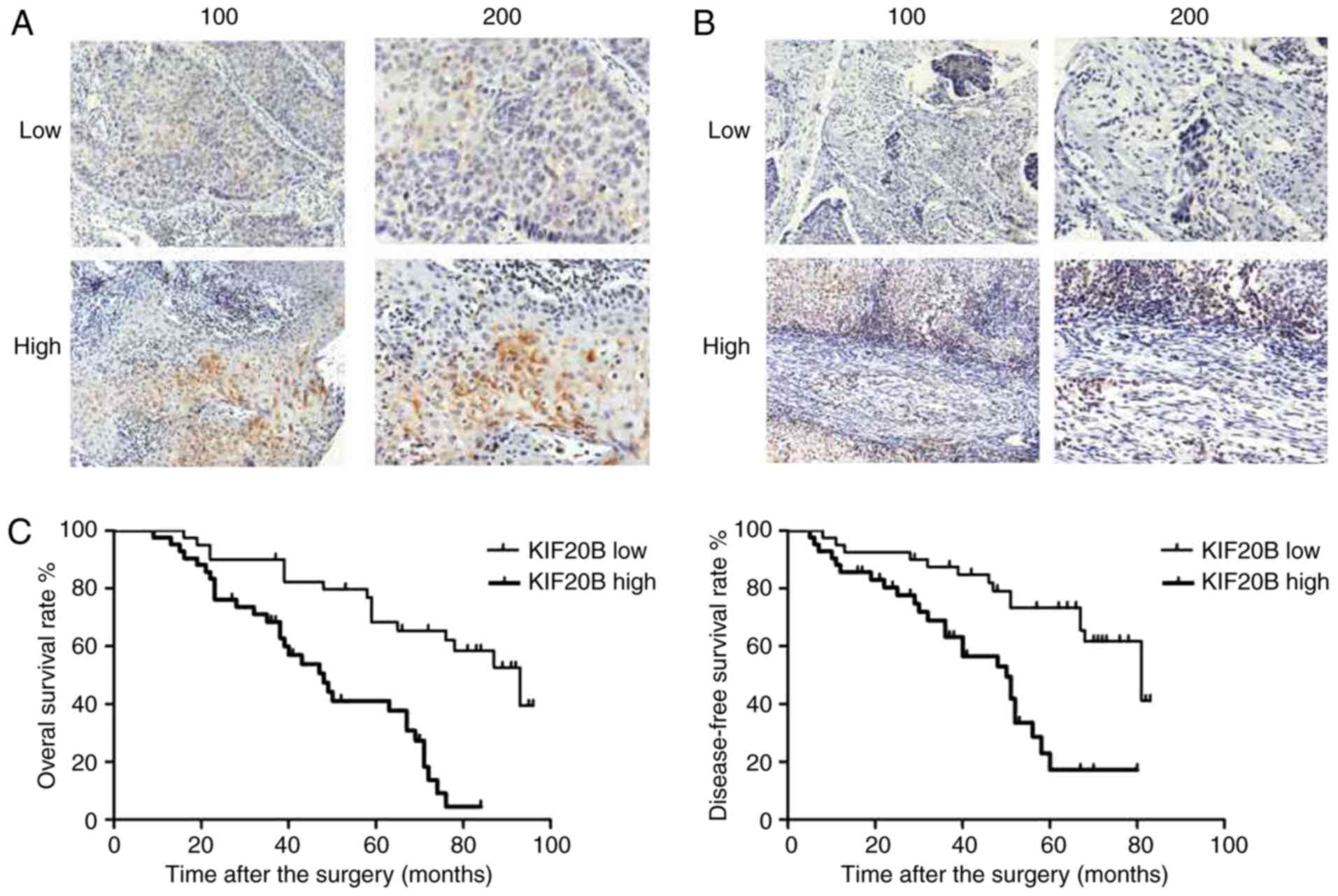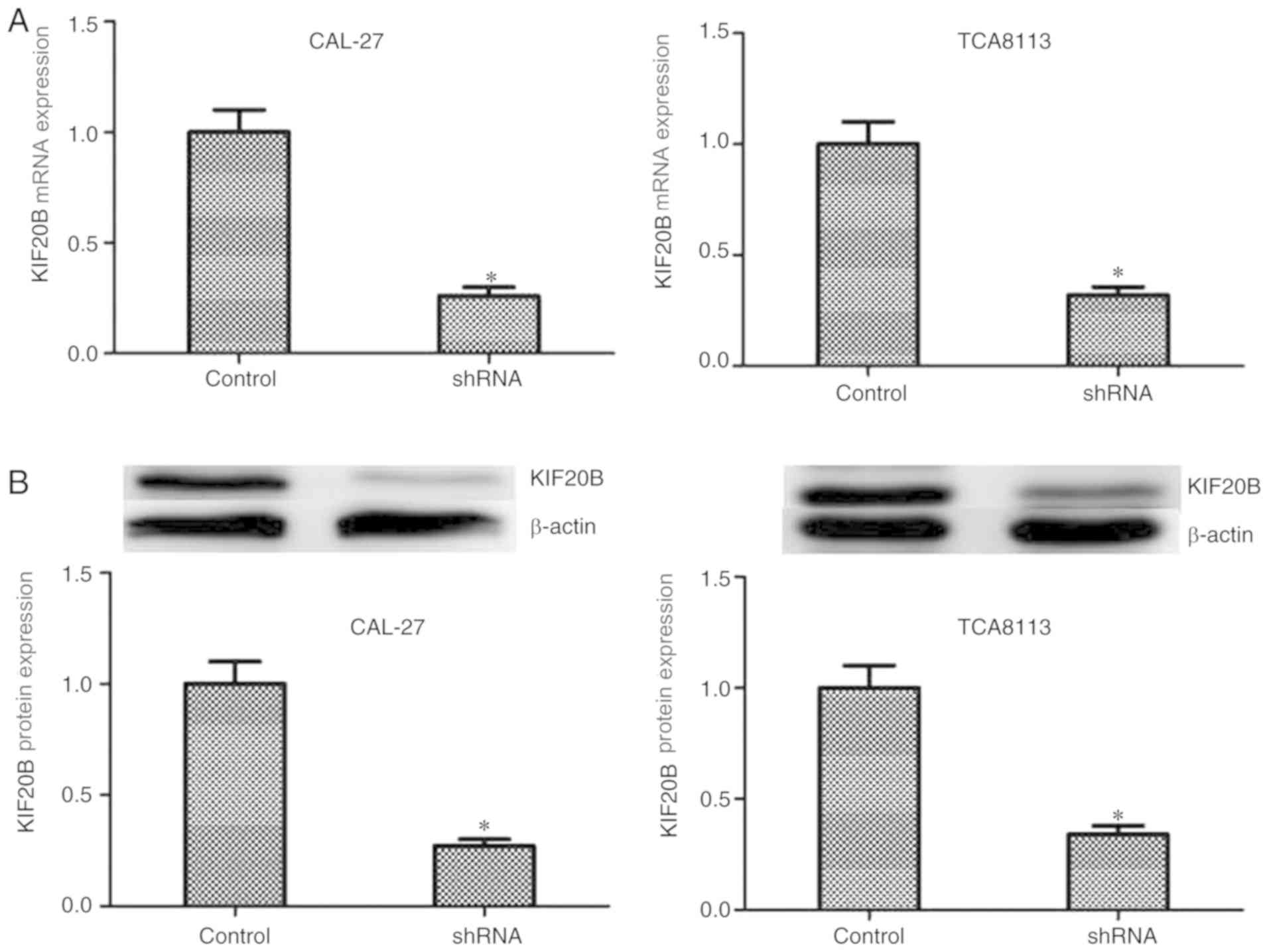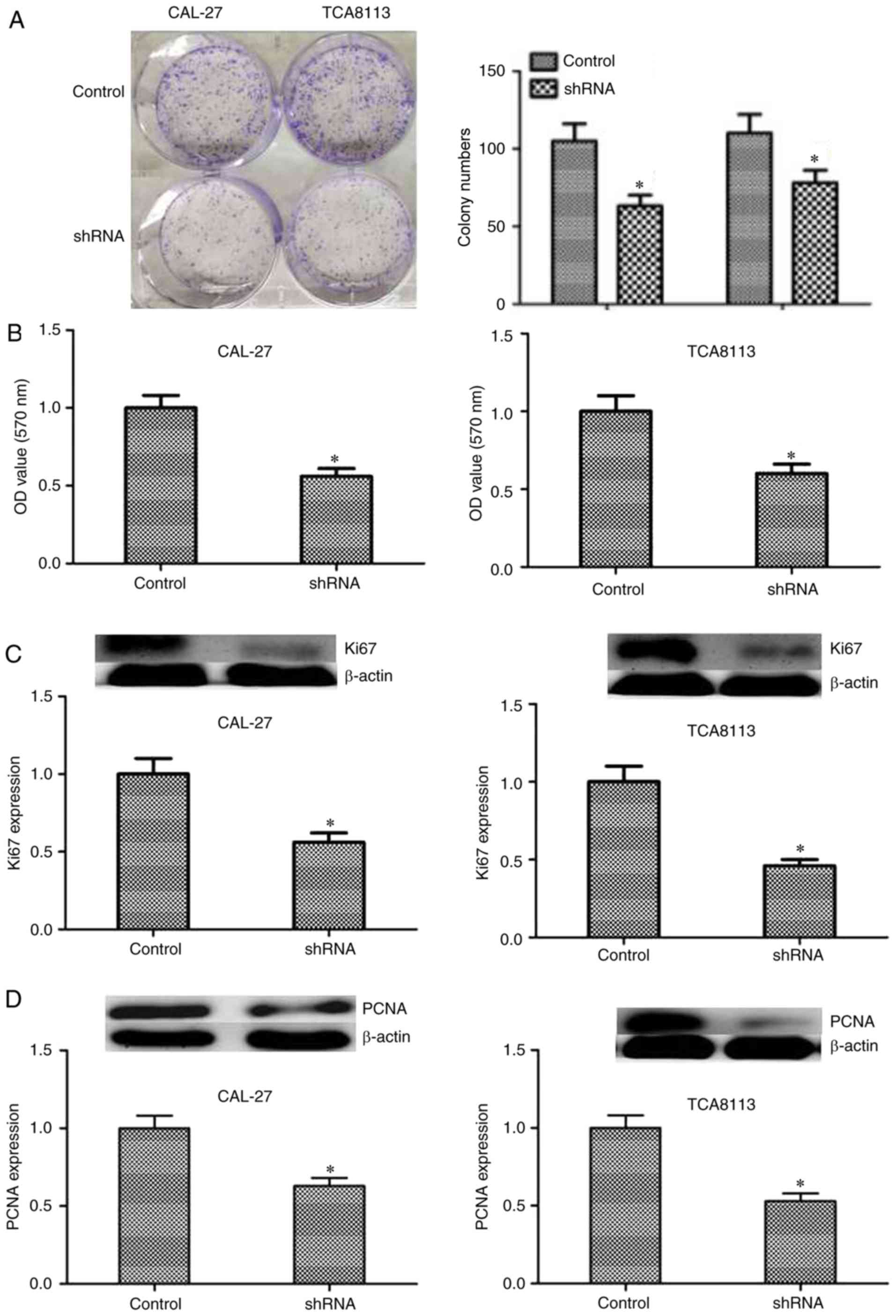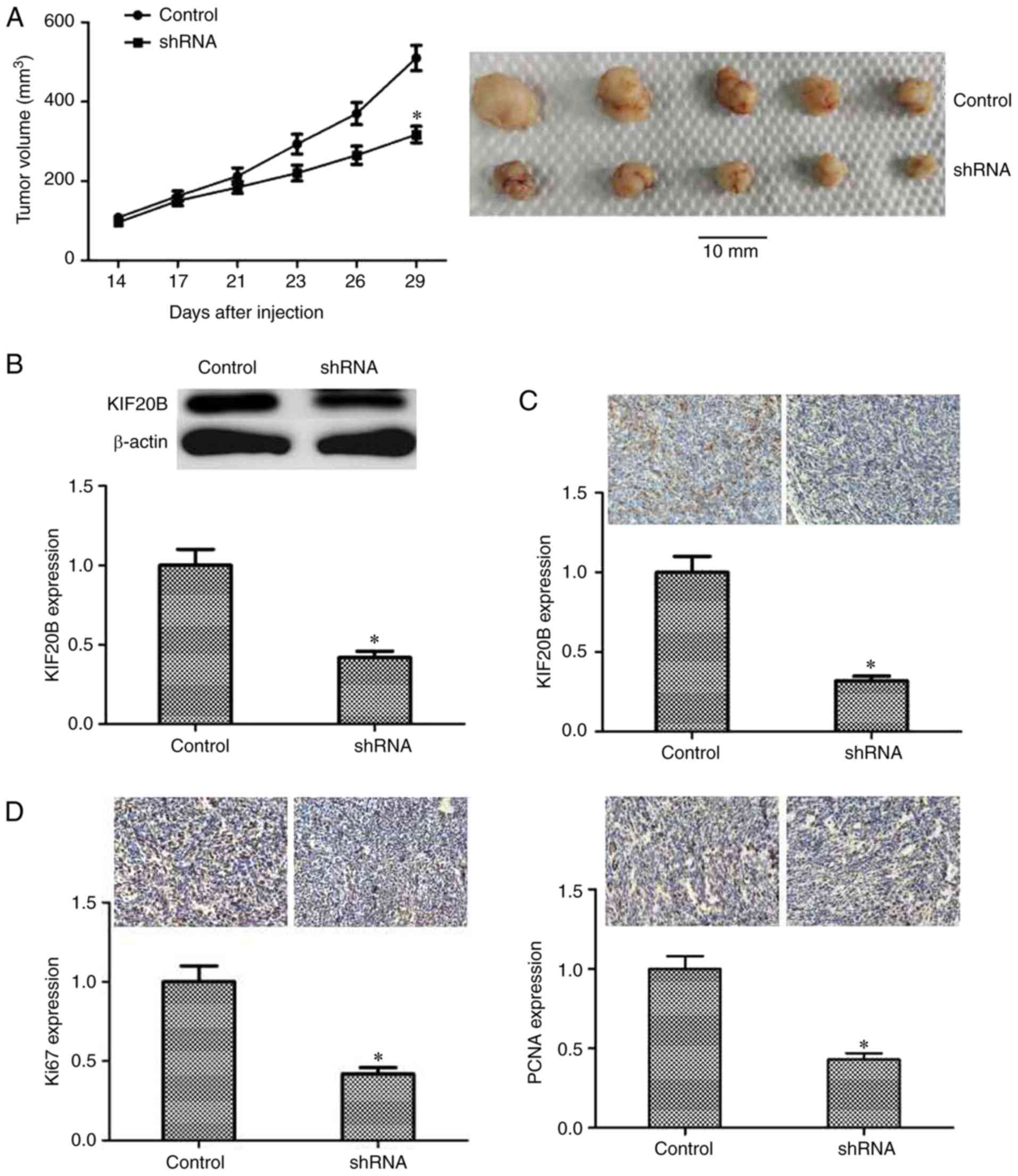|
1
|
Lingen MW, Kalmar JR, Karrison T and
Speight PM: Critical evaluation of diagnostic aids for the
detection of oral cancer. Oral Oncol. 44:10–22. 2008. View Article : Google Scholar : PubMed/NCBI
|
|
2
|
Siegel RL, Miller KD and Jemal A: Cancer
statistics, 2017. CA Cancer J Clin. 67:7–30. 2017. View Article : Google Scholar : PubMed/NCBI
|
|
3
|
Matsumoto-Taniura N, Pirollet F, Monroe R,
Gerace L and Westendorf JM: Identification of novel M phase
phosphoproteins by expression cloning. Mol Biol Cell. 7:1455–1469.
1996. View Article : Google Scholar : PubMed/NCBI
|
|
4
|
Kanehira M, Katagiri T, Shimo A, Takata R,
Shuin T, Miki T, Fujioka T and Nakamura Y: Oncogenic role of
MPHOSPH1, a cancer-testis antigen specific to human bladder cancer.
Cancer Res. 67:3276–3285. 2007. View Article : Google Scholar : PubMed/NCBI
|
|
5
|
Abaza A, Soleilhac JM, Westendorf J, Piel
M, Crevel I, Roux A and Pirollet F: M phase phosphoprotein 1 is a
human plus-end-directed kinesin-related protein required for
cytokinesis. J Biol Chem. 278:27844–27852. 2003. View Article : Google Scholar : PubMed/NCBI
|
|
6
|
Obara W, Ohsawa R, Kanehira M, Takata R,
Tsunoda T, Yoshida K, Takeda K, Katagiri T, Nakamura Y and Fujioka
T: Cancer peptide vaccine therapy developed from oncoantigens
identified through genome-wide expression profile analysis for
bladder cancer. Jpn J Clin Oncol. 42:591–600. 2012. View Article : Google Scholar : PubMed/NCBI
|
|
7
|
Liu X, Zhou Y, Liu X, Peng A, Gong H,
Huang L, Ji K, Petersen RB, Zheng L and Huang K: MPHOSPH1: A
potential therapeutic target for hepatocellular carcinoma. Cancer
Res. 74:6623–6634. 2014. View Article : Google Scholar : PubMed/NCBI
|
|
8
|
Lin WF, Lin XL, Fu SW, Yang L, Tang CT,
Gao YJ, Chen HY and Ge ZZ: Pseudopod-associated protein KIF20B
promotes Gli1-induced epithelial-mesenchymal transition modulated
by pseudopodial actin dynamic in human colorectal cancer. Mol
Carcinog. 57:911–925. 2018. View
Article : Google Scholar : PubMed/NCBI
|
|
9
|
Ansari D, Andersson R, Bauden MP,
Andersson B, Connolly JB, Welinder C, Sasor A and Marko-Varga G:
Protein deep sequencing applied to biobank samples from patients
with pancreatic cancer. J Cancer Res Clin Oncol. 141:369–380. 2015.
View Article : Google Scholar : PubMed/NCBI
|
|
10
|
Liu X, Li Y, Zhang X, Liu XY, Peng A, Chen
Y, Meng L, Chen H, Zhang Y, Miao X, et al: Inhibition of kinesin
family member 20B sensitizes hepatocellular carcinoma cell to
microtubule-targeting agents by blocking cytokinesis. Cancer Sci.
109:3450–3460. 2018. View Article : Google Scholar : PubMed/NCBI
|
|
11
|
Livak KJ and Schmittgen TD: Analysis of
relative gene expression data using real-time quantitative PCR and
the 2(-Delta Delta C(T)) method. Methods. 25:402–408. 2001.
View Article : Google Scholar : PubMed/NCBI
|
|
12
|
Miki H, Okada Y and Hirokawa N: Analysis
of the kinesin superfamily: Insights into structure and function.
Trends Cell Biol. 15:467–476. 2005. View Article : Google Scholar : PubMed/NCBI
|
|
13
|
Schlisio S, Kenchappa RS, Vredeveld LC,
George RE, Stewart R, Greulich H, Shahriari K, Nguyen NV, Pigny P,
Dahia PL, et al: The kinesin KIF1Bbeta acts downstream from EglN3
to induce apoptosis and is a potential 1p36 tumor suppressor. Genes
Dev. 22:884–893. 2008. View Article : Google Scholar : PubMed/NCBI
|
|
14
|
Hirokawa N: Organelle transport along
microtubules-the role of KIFs. Trends Cell Biol. 6:135–141. 1996.
View Article : Google Scholar : PubMed/NCBI
|
|
15
|
Hirokawa N: Kinesin and dynein superfamily
proteins and the mechanism of organelle transport. Science.
279:519–526. 1998. View Article : Google Scholar : PubMed/NCBI
|
|
16
|
Hirokawa N and Takemura R: Molecular
motors and mechanisms of directional transport in neurons. Nat Rev
Neurosci. 6:201–214. 2005. View
Article : Google Scholar : PubMed/NCBI
|
|
17
|
Tipton AR, Wren JD, Daum JR, Siefert JC
and Gorbsky GJ: GTSE1 regulates spindle microtubule dynamics to
control Aurora B kinase and Kif4A chromokinesin on chromosome arms.
J Cell Biol. 216:3117–3132. 2017. View Article : Google Scholar : PubMed/NCBI
|
|
18
|
Li QR, Yan XM, Guo L, Li J and Zang Y:
AMPK regulates anaphase central spindle length by phosphorylation
of KIF4A. J Mol Cell Biol. 10:2–17. 2018. View Article : Google Scholar : PubMed/NCBI
|
|
19
|
Gu Y, Lu L, Wu L, Chen H, Zhu W and He Y:
Identification of prognostic genes in kidney renal clear cell
carcinoma by RNAseq data analysis. Mol Med Rep. 15:1661–1667. 2017.
View Article : Google Scholar : PubMed/NCBI
|
|
20
|
Hu CK, Coughlin M, Field CM and Mitchison
TJ: KIF4 regulates midzone length during cytokinesis. Curr Biol.
21:815–824. 2011. View Article : Google Scholar : PubMed/NCBI
|
|
21
|
Lee YM, Lee S, Lee E, Shin H, Hahn H, Choi
W and Kim W: Human kinesin superfamily member 4 is dominantly
localized in the nuclear matrix and is associated with chromosomes
during mitosis. Biochem J. 360:549–556. 2001. View Article : Google Scholar : PubMed/NCBI
|
|
22
|
Wu G and Chen PL: Structural requirements
of chromokinesin Kif4A for its proper function in mitosis. Biochem
Biophys Res Commun. 372:454–458. 2008. View Article : Google Scholar : PubMed/NCBI
|
|
23
|
Wandke C, Barisic M, Sigl R, Rauch V, Wolf
F, Amaro AC, Tan CH, Pereira AJ, Kutay U, Maiato H, et al: Human
chromokinesins promote chromosome congression and spindle
microtubule dynamics during mitosis. J Cell Biol. 198:847–863.
2012. View Article : Google Scholar : PubMed/NCBI
|
|
24
|
Adams RR, Tavares AA, Salzberg A, Bellen
HJ and Glover DM: Pavarotti encodes a kinesin-like protein required
to organize the central spindle and contractile ring for
cytokinesis. Genes Dev. 12:1483–1494. 1998. View Article : Google Scholar : PubMed/NCBI
|
|
25
|
Hill E, Clarke M and Barr FA: The
Rab6-binding kinesin, Rab6-KIFL, is required for cytokinesis. EMBO
J. 19:5711–5719. 2000. View Article : Google Scholar : PubMed/NCBI
|
|
26
|
Nislow C, Lombillo VA, Kuriyama R and
McIntosh JR: A plus-end-directed motor enzyme that moves
antiparallel microtubules in vitro localizes to the interzone of
mitotic spindles. Nature. 359:543–547. 1992. View Article : Google Scholar : PubMed/NCBI
|
|
27
|
Janisch KM, McNeely KC, Dardick JM, Lim SH
and Dwyer ND: Kinesin-6 KIF20B is required for efficient
cytokinetic furrowing and timely abscission in human cells. Mol
Biol Cell. 29:166–179. 2018. View Article : Google Scholar : PubMed/NCBI
|
|
28
|
Lucanus AJ and Yip GW: Kinesin
superfamily: Roles in breast cancer, patient prognosis and
therapeutics. Oncogene. 37:833–838. 2018. View Article : Google Scholar : PubMed/NCBI
|
|
29
|
Taniuchi K, Furihata M and Saibara T:
KIF20A-mediated RNA granule transport system promotes the
invasiveness of pancreatic cancercells. Neoplasia. 16:1082–1093.
2014. View Article : Google Scholar : PubMed/NCBI
|
|
30
|
Stangel D, Erkan M, Buchholz M, Gress T,
Michalski C, Raulefs S, Friess H and Kleeff J: Kif20a inhibition
reduces migration and invasion of pancreatic cancer cells. J Surg
Res. 197:91–100. 2015. View Article : Google Scholar : PubMed/NCBI
|
|
31
|
Taniuchi K, Nakagawa H, Nakamura T, Eguchi
H, Ohigashi H, Ishikawa O, Katagiri T and Nakamura Y:
Down-regulation of RAB6KIFL/KIF20A, a kinesin involved with
membrane trafficking of discs large homologue 5, can attenuate
growth of pancreatic cancer cell. Cancer Res. 65:105–112.
2005.PubMed/NCBI
|
|
32
|
Asahara S, Takeda K, Yamao K, Maguchi H
and Yamaue H: Phase I/II clinical trial using HLA-A24-restricted
peptide vaccine derived from KIF20A for patients with advanced
pancreatic cancer. J Transl Med. 11:2912013. View Article : Google Scholar : PubMed/NCBI
|
|
33
|
Yan GR, Zou FY, Dang BL, Zhang Y, Yu G,
Liu X and He QY: Genistein-induced mitotic arrest of gastric cancer
cells by downregulating KIF20A, a proteomics study. Proteomics.
12:2391–2399. 2012. View Article : Google Scholar : PubMed/NCBI
|
|
34
|
Khongkow P, Gomes AR, Gong C, Man EP,
Tsang JW, Zhao F, Monteiro LJ, Coombes RC, Medema RH, Khoo US and
Lam EW: Paclitaxel targets FOXM1 to regulate KIF20A in mitotic
catastrophe and breast cancer paclitaxel resistance. Oncogene.
35:990–1002. 2016. View Article : Google Scholar : PubMed/NCBI
|
|
35
|
Sun X, Jin Z, Song X, Wang J, Li Y, Qian
X, zhang Y and Yin Y: Evaluation of KIF23 variant 1 expression and
relevance as a novel prognostic factor in patients with
hepatocellular carcinoma. BMC Cancer. 15:9612015. View Article : Google Scholar : PubMed/NCBI
|
|
36
|
Kato T, Wada H, Patel P, Hu HP, Lee D,
Ujiie H, Hirohashi K, Nakajima T, Sato M, Kaji M, et al:
Overexpression of KIF23 predicts clinical outcome in primary lung
cancer patients. Lung Cancer. 92:53–61. 2016. View Article : Google Scholar : PubMed/NCBI
|
|
37
|
Takahashi S, Fusaki N, Ohta S, Iwahori Y,
Iizuka Y, Inagawa K, Kawakami Y, Yoshida K and Toda M:
Downregulation of KIF23 suppresses glioma proliferation. J
Neurooncol. 106:519–529. 2012. View Article : Google Scholar : PubMed/NCBI
|
|
38
|
Sun L, Zhang C, Yang Z, Wu Y, Wang H, Bao
Z and Jiang T: KIF23 is an independent prognostic biomarker in
glioma, transcriptionally regulated by TCF-4. Oncotarget.
7:24646–24655. 2016.PubMed/NCBI
|


















